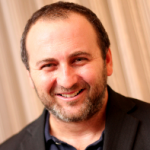BizSpark Member and DEMO Africa Roundup
It's time to do a quick roundup of what African entrepreneurs know that you don't know.
DEMO Africa ended on Friday, but that won't stop us from running our remaining interviews with some of the participants.
Big congratulations go to two of our Microsoft BizSpark members, SASA Africa and Flowgear, who both came away with the coveted DEMO Lion title out of a field of 40. In truth, the field was much bigger, since this competition was open to all of Africa.
In the run up to DEMO Africa -- and during -- we showcased the work of the several dozen entrepreneurs who bravely presented their ideas to the judges.
Hilda Moraa, MyOrder
What have you learned about managing a technological business that you would pass on to the next generation?
Managing a technological business as an individual is not possible. It requires a team that is passionate, talented and believes in technology as a strategic tool and not the magical solution to solve all problems. Understanding the technological development methodology and processes is also important to facilitate ensure easier management of the business.
I have also learnt that the most important thing is to execute and do it fast. As a technological business is dynamic, hence one needs to execute, release their product, test and validate. Its better to fail early then learn from the feedback that should inform a young business how to validate their products, answer their assumptions and plan effectively what should change or be added as valuable features in order to be successful. Most important, I have learnt it’s important to connect the technology with business. As the technology solution cannot work solemnly, one needs to identify how they can use that technology as an enabler to then solve the real needs that will create revenue or ‘scratch an itch’
What came first for your company – the product idea or your existence on the internet?
The existence of the Internet came first. And it was through this existence that the development of electronic tools, infrastructure, protocols of communication that have then had a huge impact to the development of electronic commerce. Including the rise of telecommunications that has resulted to rapid numbers of mobile subscribers to further facilitate execution of commercial transactions electronically.
Thanks to the growth of the Internet access via mobile phones, many businesses today are not only interested in showcasing their products online, but also allowing their customers to transact by placing orders. Their customers would like to do so through the most convenient device at their disposal: their mobile phones. A need that Myorder retail has bridged by offering a hosted solution that puts a “mobile menu” in the hands of a customer. Items that one has for sale can be selected, and orders placed. Each business gets a simple, attractive mobile web catalog. Notifications are sent to a designated mobile phone of choice when an order is placed, detailing the name and phone number of the customer, current location, as well as the pricing and details of the order.
Kekeli Buckner, KKYB Productions
What have you learned about managing a technological business that you would pass on to the next generation?
I have learned a lot about managing a technological business but two of the most important things I have learned include the fact that technology keeps developing and in order to stand out as a business in that field we must be abreast with the latest trends in the industry and be innovative too.
I have also learnt to work effectively with my team and not make decisions single handedly because some of them know more than I do in the field of technology. So basically what I would pass on to the next generation is that they should think smart, be creative, work together as a team and keep the right attitude because one cannot know it all.
Who inspired you the most this week, and why?
For this week I would say Mrs. Gloria Buckman Yankson inspired me most. She is the CEO of Planit Ghana and has been nominated for the 2nd International Award in under a year via the 2012 Ghana UK Based Achievement (GUBA) Awards. I saw it on her facebook profile. Even though I have not spoken to her yet, I have been to events where she was giving a talk and just from listening to her you can almost understand why she is so successful. Her work ethic really inspires me.
Maxwell Donker, INNOQIK
What have you learned about managing a technological business that you would pass on to the next generation?
Managing a Technological Business is very interesting. Unlike others Business whose management revolves about Business, with Technological Companies, you not only manage the business but also the technological growth and sustainability of it. One major lesson I have learnt is to one has to keep up with time and if possible be ahed of time. Technology evolves every second. Something that works better and fine today may not be up to the accepted standard the next day. You always have to make your product and business relevant to your client else the business takes a down turn.
What was the most difficult challenge your business faced this year?
Maxwell: Well, we have not been in business for a year yet, but in the short period we have been operating, a major challenge has been the process of taking clients through the learning curve and managing change. Customers always want more even when they were ignorant of the impending need. We have to help them match our services and value proposition to their needs and deliver efficiently.
How do you know when you are failing in Product Development and how do you make a correction - do you make the decision on your own, or do you consult your team?
Most of the time, decisions for corrections is in consultation with the team. This is because the decision to take a particular line or route is initiated by myself but discussed and agreed at the team level. That way everyone buys into the vision and revised to make the most out of that decision. With that in place, when changes are going to be made, every member of the team must be made aware and ready to shift for the change to take place. Identifying failure in Product development is mainly through quality assurance analysis which is also agreed at the initiation of each product segment, that way once we are out of line with our blue print we automatically know something is failing which can either be from a good source or bad.
What signals from your consumers do you look for to signify that you are winning?
Some of the few signals from consumers that signify our product or service is winning is when consumers continue to use our services and ask for more improvement and efficiency. That make me know we are still solving a need and have to make it more efficient. Another is when they are willing to give advice and share ideas t improve service delivery.
Microsoft BizSpark Member Eric Edelstein, EVLY
What have you learned about managing a technological business that you would pass on to the next generation?
Be prepared for a fast but exciting journey, and accept that change will happen constantly in the early stages of growing the business. Every day at evly is an adventure.
What was the most difficult challenge your business faced this year?
evly is a startup, so of course, funding, funding, funding! The other thing is that as evly is in such a new cutting edge industry, the evly team spends a lot of energy and effort educating the marketplace.
Who would you like to be your mentor, and what would you ask him or her?
For most of my life, I would have said Richard Branson, but in the last few years, after reading the "7 Day Weekend", I would jump at the opportunity to be mentored by Ricardo Semler, who has steered the fastest growing company in South America, SEMCO.
Who is your mentor, and what was the last great thing he or she told you and your team?
I have a number of mentors - the last coffee I had with one of my mentors, they told me their story of how they built up their business's - that kept me inspired for days.
What has overjoyed you in the past month?
Obviously, the number 1 item was when evly was chosen as one of the top 40 in the Demo-Africa competition, allowing us to represent South Africa in Kenya in October. Also, every time we get feedback from one of the organisations using the evly software that they're getting the desired results from our software, it gets me overjoyed.
Who inspired you the most this week, and why?
The evly team - they are the most passionate team I've ever had the pleasure of working with.
When was the last time you fell in love with a product?
About 10 minutes ago when I last looked at the evly website, and saw what we were creating.
What does something in your business vertical need in order for the product to be successful?
The organisations who use our software need to have the ability to realise that organisations who succeed in the future will need to have "constructive engagement" with their customers & fans in order to be successful.
What came first for your company – the product idea or your existence on the internet?
We came up with an idea for evly, and then launched the company, and although we've pivoted a number of times to refine the product idea, the long term vision has always remained consistent.
Is the lean startup process a type of marketing, or is marketing different from customer and product development?
The "lean startup" should be a mindset for the company, as a whole. Get the forward momentum going as quickly as possible, test constantly, iterate, and change quickly and nimbly when required.
How does your company utilize next generation marketing techniques?
evly is a next generation company as a whole - our marketing follows that.



